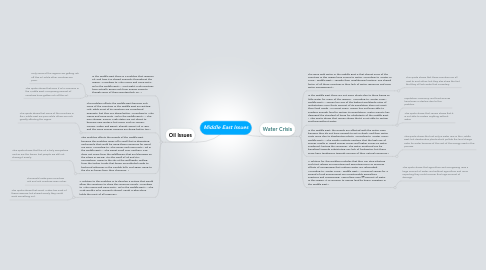
1. Oil Issues
1.1. In the Middle East there is a problem that requires oil, and how it is shared unevenly throughout the region. According to "The Haves and Have-Nots : Oil in the Middle East", "Just eight Arab countries have actually grown rich from energy exports, though some of them spectacularly so..."
1.1.1. Only some of the regions are getting rich off this oil, while other countries are poor.
1.1.2. This quote shows that even if oil is common in the Middle East, a surprising amount of countries have gotten rich off this oil.
1.2. This problem affects the Middle East because only some of the countries in the Middle East are getting rich, while most of its countries are considered peasants, but they are doing better. According to "The Haves and Have-Nots : Oil in the Middle East", " This may change. Poorer Arab states are not about to become new Qatar’s, but many, such as Yemen, Tunisia, Sudan and Egypt, already export oil or gas, and the some energy paupers are doing better too."
1.2.1. This quote shows that some of the countries in the Middle East are poor while others are rich, greatly affecting the region.
1.3. This problem affects the people of the Middle East because this problem gives off a smell that is disgusting and people that could be using these resources for good are poor. According to "The Haves and Have-Nots : Oil in the Middle East", "The sweet smell over northern Iraq does not come from the wildflowers that are blooming on the plains in spring. It is the smell of oil and it is everywhere, rising to the sky at the wellheads, spilling from the tanker trucks that bump up potholed roads to backyard refineries in the Kurdish hills, and again rising to the sky as fumes from their chimneys. "
1.3.1. This quote shows that this oil is truly everywhere and so are the fumes, but people are still not sharing it evenly.
1.4. A solution to this problem is to develop a system that would allow the countries to share this resource evenly. According to "The Haves and Have-Nots : Oil in the Middle East", "The Arab world’s oil is unevenly shared. Saudi Arabia alone holds the most of all reserves."
1.4.1. This would make poor countries rich and rich countries even richer.
1.4.2. This quote shows that Saudi Arabia has most of these reserves, but shared evenly they could work something out.
2. Water Crisis
2.1. The issue with water in the Middle East is that almost none of the countries in this region have access to water. According to "Water in Crisis - Middle East", "Beside their neighboring location, one shared factor of all these countries is their lack of water resources and poor water management."
2.1.1. This quote shows that these countries are all next to each other, but they also share the fact that they all lack water that is sanitary.
2.2. In the Middle East there are not many plants due to there being so little water for many of the regions. According to "Water Crisis - Middle East", "Yemen has one of the highest worldwide rates of malnutrition; over thirty percent of its population does not meet their food needs . In recent years, Yemen has not been able to produce enough food to sustain its populations. Water scarcity has damaged the standard of living for inhabitants of the Middle East. " This quote shows that Yemen shows that it is not able to sustain anything without water.
2.2.1. Population, economy, and food sources have been in decline due to this problem.
2.2.2. This quote shows that Yemen shows that it is not able to sustain anything without water.
2.3. In the Middle East, the people are affected with the water issue because they do not have enough to eat or drink, and their water costs more due to desalination plants. According to "Water Crisis - Middle East", "The Pacific Institute explains that the high use of energy results in raised energy prices and higher prices on water produced, hurting the consumer. The water produced can be beneficial towards substituting any lack of freshwater, but these areas have tendencies towards overuse of their natural resources."
2.3.1. This quote shows that not only is water rare in the Middle East, but desalination plants which pollute the land charge extra for water because of the cost of the energy used in this process.
2.4. A solution for this problem includes that they can stop planting and start relying on importing and exporting more so previous effects of overgrazing that reduces water are rebounded. According to "Water Crisis - Middle East", "Universal causes for a spread of arid environment are unsustainable agriculture practices and overgrazing. Agriculture uses 85 percent of water in this region. It is common to misuse land by heavy irrigation in the Middle East."
2.4.1. This quote shows that agriculture and overgrazing uses a huge amount of water, and without agriculture and more importing they could recover this huge amount of damage.

